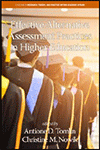
Effective Alternative Assessment Practices in Higher Education
Edited by:
Antione D. Tomlin, Anne Arundel Community College
Christine M. Nowik, Central Pennsylvania’s Community College
A volume in the series: Research, Theory, and Practice Within Academic Affairs. Editor(s): Antione D. Tomlin, Anne Arundel Community College. Sherella Cupid, Louisiana State University.
Published 2024
COVID-19 and increased attention to how institutions of higher education (IHEs) serve an increasingly diverse student population have brought conversations about “standard” practices from the margins to the center as faculty explore how to improve learning and student success for all students.
Historically, IHEs were built by a privileged class for a privileged class, a system, and structure built on specific epistemologies, practices, and habits of mind and language that replicate privilege and leave many students underserved in their academic pursuits.
One way faculty have increased equity in their college classrooms is through the use of alternative assessment (alt-assessment) practices. This volume aims to share the experiences of faculty who have leveraged “non-traditional” grading paradigms for the sake of increasing student learning, a sense of belonging, and equity in their classrooms. Meant to orient faculty who are considering how to implement alt-assessment in their own classes as well as those who are already employing various grading frameworks, this volume will celebrate new and innovative approaches, share lessons learned, and invite a broader coalition of faculty into the stream of conversation about pedagogical innovation.
Faculty, educators, and practitioners share their approaches to alternate assessment in this volume, as well as the critiques, lessons, and outcomes associated with their pedagogical decisions. Written by practitioners for practitioners, we hope the book will provide theoretical and practical guidance for alternative assessment practices such as ungrading, contract grading, standards-based grading, and labor-based grading across various disciplines and within different academic contexts.
CONTENTS
Introduction, Christine M. Nowik. PART I. The Journey to Equitable Grading Practices in Higher Education, Rebecca D. Brown and Kirsten R. Robbins. Looking Backward, Looking Forward: Reflection as Embedded, Iterative Practice at New College of Florida, Carrie Beneš, Elizabeth Leininger, and Jennifer Wells. Stumbling Into the Right Grading System, Brittany N. Avila. Small Steps to Ungrading the Language Classroom, Lori Mesrobian. Rediscovering a Joy for Teaching Through Alternative Assessment: Completion-Based Grading and Peer Review, Kimberly M. Baker. Let Them Set the Course: Supporting Student Agency Through Ungrading and Emergent Outcomes, Andrew M. Zinck. Three Techniques to Increase Engagement and Learning. Julie K. Ambrose. PART II. Strategies for Teaching From the Tabletop: A Role-Playing Gamer’s Approach to Class Planning, Nick Cialini. Learning to Take Chances: Ungrading, Experimentation, and Cura Personalis in History Courses, Elizabeth A. Drummond. Democratizing Language and Assessment Practice in the Writing Classroom, Matt Greene. Specifications Grading Meets Computer Science: Implementations in Skill- and Project-Based Courses, David L. Largent. Labor-Based Grading: An Equitable and Revitalizing Assessment Method in Writing Classrooms, Anthony Lince. Using UNgrading Assessment Practices to Enhance Immersive Learning Experiences in Student-Led, Community -Engaged Courses, Lynne M. Stallings and David L. Largent. Engagement-Based Ungrading Practices, Keith W. Mathias. PART III. Ungrading Without Burnout: Methods for Relationship-Centered Online Teaching, Rachel A. Zimmerman. Building Community Through Alternative Assessment in an Online Course, Leah K. Clarke. Ungrading ESL Teacher Education, Nigel A. Caplan. Community-Engaged Learning and Alternative Assessment: A Natural Partnership, Tai Munro and Lauren McMullen. Ungrading the MA Classroom, Rita Shah. Using Oral Exams to Assess Conceptual Understanding in Proof Writing Courses, Amanda Harsy. About the Editors. About the Contributors.
-
Paperback979-8-88730-577-6
Web price: $45.04 (Reg. 52.99)
-
Hardcover979-8-88730-578-3
Web price: $80.74 (Reg. 94.99)
- eBook979-8-88730-579-0

- EDU015000 - EDUCATION: Higher
- EDU021000 - EDUCATION: Non-Formal Education
- EDU001030 - EDUCATION: ADMINISTRATION: Higher
-
 Black Faculty Do It All
A Moment in The Life of a Blackademic
Black Faculty Do It All
A Moment in The Life of a Blackademic
-
 Don’t Forget About the Adjuncts!
Don’t Forget About the Adjuncts!
-
 Expanding the Vision of Faculty Learning Communities in Higher Education
Emerging Opportunities for Faculty to Engage Each Other in Learning, Teaching, and Support
Expanding the Vision of Faculty Learning Communities in Higher Education
Emerging Opportunities for Faculty to Engage Each Other in Learning, Teaching, and Support
-
 Institutional Diversity in American Postsecondary Education
Institutional Diversity in American Postsecondary Education
-
 Promoting Equitable Classroom Practices in Higher Education
Approaches Beyond Curriculum
Promoting Equitable Classroom Practices in Higher Education
Approaches Beyond Curriculum
-
 The Handbook for Aspiring Higher Education Leaders
The Handbook for Aspiring Higher Education Leaders
-
 Voices of the Field
DEIA Champions in Higher Education
Voices of the Field
DEIA Champions in Higher Education

